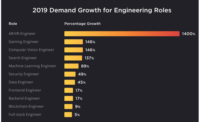A recession is coming. That was the message conveyed by Anirban Basu, chief economist, Associated Builders and Contractors (ABC), during his 2023 Construction Economic Update and Forecast webinar.
Through the 90-minute presentation, Basu provided a full-picture state of the economy, referencing sources, such as ABC’s Construction Backlog Indicator, the Architecture Billings Index, and materials prices. He touched on a number of topics, offering insight on jobs and unemployment, inflation, and, perhaps most importantly, the likelihood of a recession.
If you haven’t had a chance to sit through one of his presentations, you’re missing out. He’s highly entertaining, quite funny, and does a great job simplifying the somewhat convoluted language of economists.
Recession Progression
While Basu said a recession is more likely than it's not, he said it's difficult to pinpoint a definitive start date. And, let’s not fault him for his lack of an exact timeline. The economy is volatile. Anecdotally, the Federal Reserve raised interest rates 0.5% at 2 p.m. on Dec. 14, precisely the moment Basu’s presentation began.
Typically, the lag between policy and economic results is around one year, though that timeline is far from scientific. The fact that the Fed has not been shy about its intentions to raise rates — over and over again with no end in sight — combined with continuing economic woes on a global scale may help to speed up a recession's commencement.
On the flip side, consumers have excelled at padding their bank accounts as of late. Thanks in part to post-pandemic pay raises, government-issued stimulus checks, and extended unemployment benefits, consumers’ financial cupboards are fairly well stocked. With whispers of a recession on the horizon, many may choose to spend carefully, opting to retain their reserves rather than spending frivolously. This lack of spending activity could delay the onset of a recession.
Regardless how consumers act, the Fed is attempting to force the issue. While interest rates have shown signs of attrition — the consumer inflation rate rose only 0.1% in November, settling in at 7.1% on a year-over-year basis, which is down from 9% in June — the Fed continues to raise rates. Facetiously, one could presume that something has to break — inflation or the economy. Let’s hope it’s the former and not the latter.
Retain Key Employees
So, we’ve established that a recession is looming, but how, exactly, should your firm prepare?
During his presentation, Basu issued a poll question, asking attendees to identify the leading challenge their companies face. Fifty-six percent identified a lack of skilled worker as their greatest challenge; 28% said supply chain and materials issues; 7%, availability (or lack thereof) of financing; 5%, insufficient demand for construction services; and 4%, none of the above.
Basu was surprised by this assessment, stating the results speak to a market that is characterized by increasing demand and a lack of capacity to meet that demand.
“As an economist, if interest rates rose this sharply over the course of a nine- or 10-month period, which they did, I would have expected to see more of you saying the leading challenge is insufficient demand for construction services,” he said.
The poll solidifies why it’s of the utmost importance for firms to ensure their enterprise employees are locked into place for the long term.
“There are certain individuals in any firm who are essential to its success, I don’t care how large or small it is,” said Basu. “Take Walt Disney Corp. as an example. They had Bob Iger in the role of CEO, and then they let him go. Then, they hired in Bob Chapek, expecting greater results, but the opposite happened. Disney's performance slumped under their new CEO. So, they had to bring Iger back. As Iger has demonstrated, there are a set of employees who are incredibly important to any company. With volatile times ahead, it’s important you lock these individuals up for the long term.”
Another great example of this is New York Yankees slugger Aaron Judge, who recently received a nine-year, $360 million contract. Judge is a valuable employee of the Yankees, perhaps the most valuable (he was named MVP of the American League last year), so it makes sense for the organization to compensate him accordingly for years to come.
And, on the flip side, make sure you're weeding out underperforming employees. If you have to cut salaries, make sure these individuals have been appropriately identified and selected. If staff needs to be realigned, make sure you’re doing so in a way that makes short- and long-term sense. Don't just aim to hit a budget benchmark. Make sure you're decisions are not just saving dollars but also making sense.
Cash Rules Everything Around Me
Basu identified cash flow management as the top indicator company owners should be paying the most attention to.
“It's often said, contractors or construction firms don't die from starvation, they die from overeating,” said Basu. “Companies will often go through the spirit of downsizing, try to manage cash, etc., and, then, all of a sudden, they begin to prosper. Then, as luck would have it, the market starts cutting back. Of course, the prospering company has already started to add or lease equipment, hire more work, etc. All of a sudden, the company’s balance sheet is under pressure. They don't have enough cash to afford all the expansion and capacity. That's often when they lose their bonding; money; and, ultimately, fail.”
Basu suggests managing cash flow aggressively today so that your firm can prosper tomorrow.
“Put yourself in a position to succeed when the recovery comes,” he said. “In 2025, or so, make sure you have the cash necessary to finance your re-expansion. Manage your portions. Do what it takes to keep your firm from death of overeating.”
Conclusion
Economically, the next several years are set to be very fragile. And, while a recession can be debilitating to businesses at all levels, it doesn’t have to be. Please consider these tips when planning your budgets in 2023 and beyond. If you haven’t signed up for ABC’s CE Professional Education webinar series, please consider doing so at https://www.abc.org/Academy/Upcoming-Webinars.
And, as you navigate the choppy waters ahead, I’ll leave you with Basu’s own salutation: “I wish everyone a much better year in 2023 than I expect them to have.”





